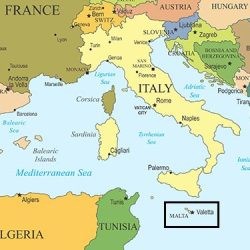Malta To Implement New Gaming Act in 2016

The small European nation of Malta has become a dynamic economic hot spot favored by both gamblers and casino operators. In 2014, gambling accounted for 8 percent of the country’s gross revenue, and the country has continued to expand gaming within its borders. Currently, the nation is home to 280 licensed operators, many of which have multiple licenses, and in 2015, they added 95 new licenses with 60 percent of those going to existing operators within the country.
A New Gaming Act Needed
Those numbers show that operators are continuing to invest in Malta, but he country also understands the importance of remaining an attractive location for casinos and gaming parlors, and so is in the process of revamping its legislation to make the country even more of interest to the gaming industry. Recently, Joseph Cuschieri, the executive chairman of the body that oversees gaming in Malta, the Malta Gaming Authority, gave an interview discussing the future of gaming in Malta. As he explained to the Times of Malta:
“We are talking about a completely new Gaming Act, the first after 12 years. The law as it now stands imposes certain duplication of compliance across gaming sectors. Some things are obsolete and need to be rescinded, and in some cases, procedures are too bureaucratic. And we cannot underestimate the technological developments that need to be catered for. Twelve years is an eternity in technology and we need to narrow the gap between technology and the law!”
Important Changes Coming
Here are some of the most important points from what he shared:
– Changes to Taxation Are in Store. Although Malta is adamantly pro gambling, it appears that in the near future tax rates will go up for operators. Cuschieri shared that it is inevitable, but stated that he believes any negative impact it has will be minimal. This is because Malta has a host of benefits to offer operators, including an English-speaking workforce, gambling legal experts, gambling technology specialists, state-of-the-art data centers for technical support, and other vital business-to-business providers that other countries can’t boast.
– The New Law Will Simplify Licensing. The main aim of the new legislation is to make it easier for qualified operators to acquire licensing, so that they’re not bogged down by bureaucratic formalities. Under the new laws, there will likely be just two standard licenses–one for business to business operators and one for business to consumer operators. A super license for operations that involve multiple companies is also being proposed. This way even if multiple platforms are involved with a license only one set of credentials will be necessary, thus greatly streamlining things.
– Digital Games of Skill Will Be Covered. Cuschieri said two years ago that he believed that digital games that combine gambling with skill were on pace to be the next big thing in gaming. His commission published a position paper on the subject, and the new legislation will include wording to help regulate this new form of gambling. The new law will have a separate set of regulations for operators that solely want to deal in this space, so they won’t receive the label of “gambling operations.”
Currently in Draft Stage
The new gambling legislation will replace the current set of laws that was passed 12 years ago and is right now in the draft stages. Consultations about the policy are underway to refine the language, and Cuschieri seems hopeful that it will pass in the Maltese Parliament before the legislative body breaks for summer recess. That means that the new law will likely be in place by the end of the year, keeping Malta positioned as Europe’s leader in gaming.
Malta’s Gaming Industry
Each year, remote gaming generates billions of dollars in revenues worldwide, not to mention the impact it has in creating other businesses which service the industry. The importance of the remote gaming was identified early by Malta, which in 2004 subsequently became the first European country to set up a legal framework positioning the country as a leading player in this sector.
More than a decade later, and the Malta Gaming Authority (MGA) oversees a lucrative remote gaming industry which generates 8% of Malta’s GDP, offers employment to in excess of 8,000 people, and also positively impacts numerous other businesses, including those in the information and communications technology (ICT) sector, corporate services, and hospitality. The MGA currently has 280 licensed operators and 510 remote gaming licences on its books, and that numbers continues to climb steadily.









